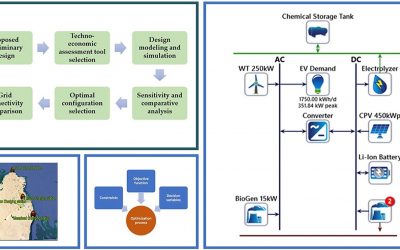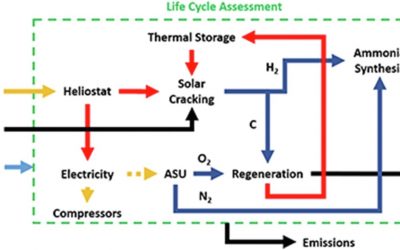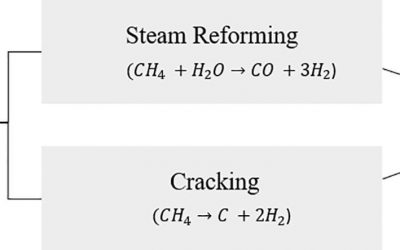Research
Carbon-free clean fuels and energy carriers can be utilized in various applications such as power generation, energy transport, energy storage. If these carbon-free energy carriers are produced from renewable sources such as solar energy, then they offer significant carbon reductions in the world.
One of the key advantages of producing hydrogen and ammonia from solar energy is the ability of storing solar energy in the form of chemical medium, which then be converted into electricity and can be transported overseas. Especially, for solar power plants which require extensive battery storage units, hydrogen and ammonia can be generated during the day using excess electricity and can be used to produce electricity during the night-time offering a more reliable and energy dense alternative.
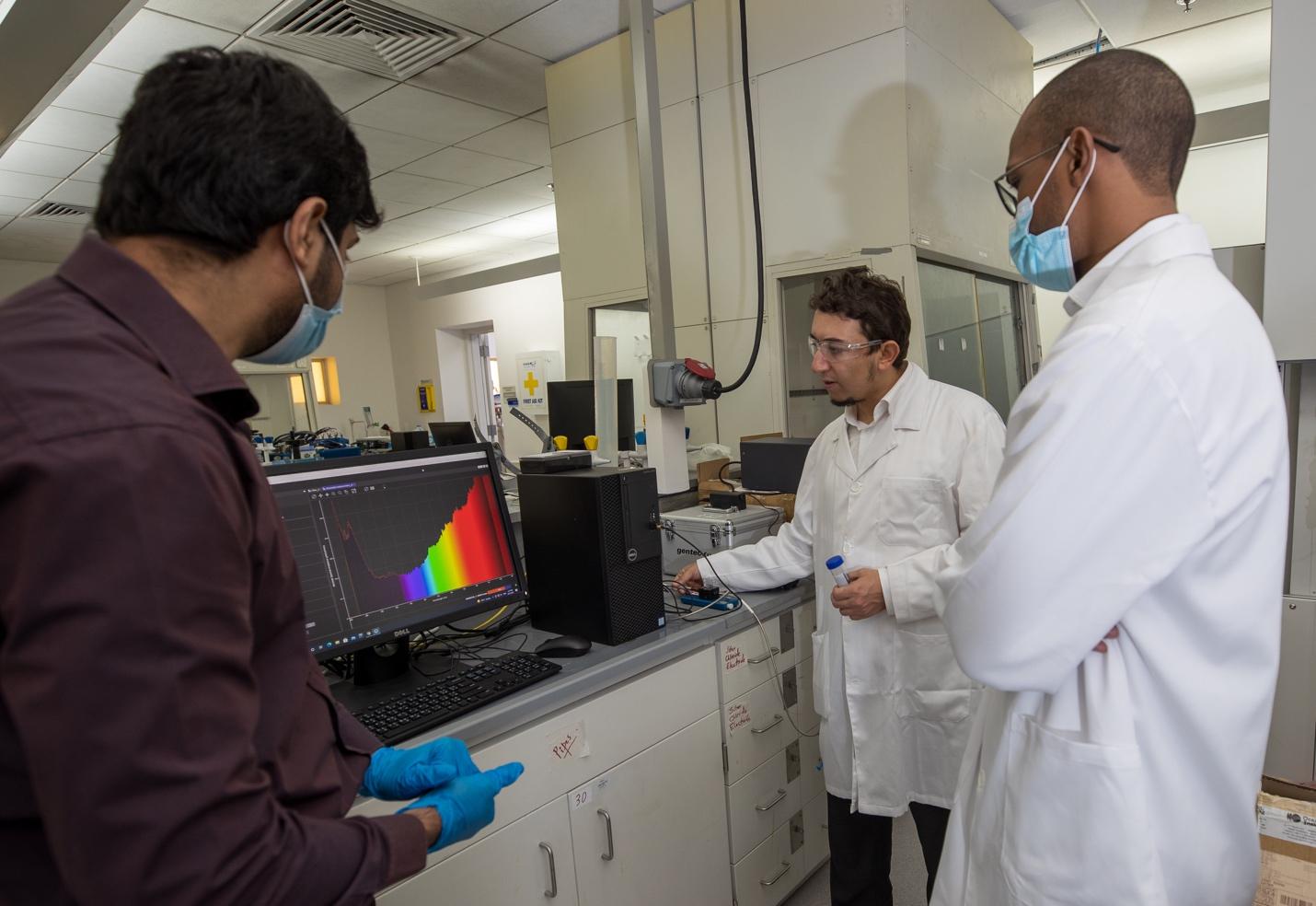
Research Highlights
Techno-Economic Optimization Of A Novel Stand-Alone Renewables-Based Electric Vehicle Charging Station In Qatar
One of the main challenges of e-mobility roll-out is securing the required charging demand without stressing the existing power grid. The electrical source must be non-conventional to achieve the ultimate eco-friendly goal.
Life Cycle Assessment Of Clean Ammonia Synthesis From Thermo-Catalytic Solar Cracking Of Liquefied Natural Gas
Ammonia is considered a sustainable energy storage medium with zero carbon content. In this work, thermal catalytic cracking of liquefied natural gas (LNG) at elevated temperatures employing concentrated solar tower is considered to produce clean hydrogen (CO2-free) and studied in terms of life cycle emissions.
Review On Cox-Free Hydrogen From Methane Cracking: Catalysts, Solar Energy Integration And Applications
Hydrogen fuel production from methane cracking is a sustainable process compared to the ones currently in practice due to minimal greenhouse gas emissions. Carbon black that is co-produced is a valuable product and can be marketed to other industries.
SUNREIS research group is mainly motivated by Sustainable Development Goals (SDGs) developed by United Nations (UN) to address the grand challenges of the current century:
SDG 6: Clean Water and Sanitation
SDG 7: Affordable and Clean Energy
SDG 11: Sustainable Cities and Communities
SDG 13: Climate Action
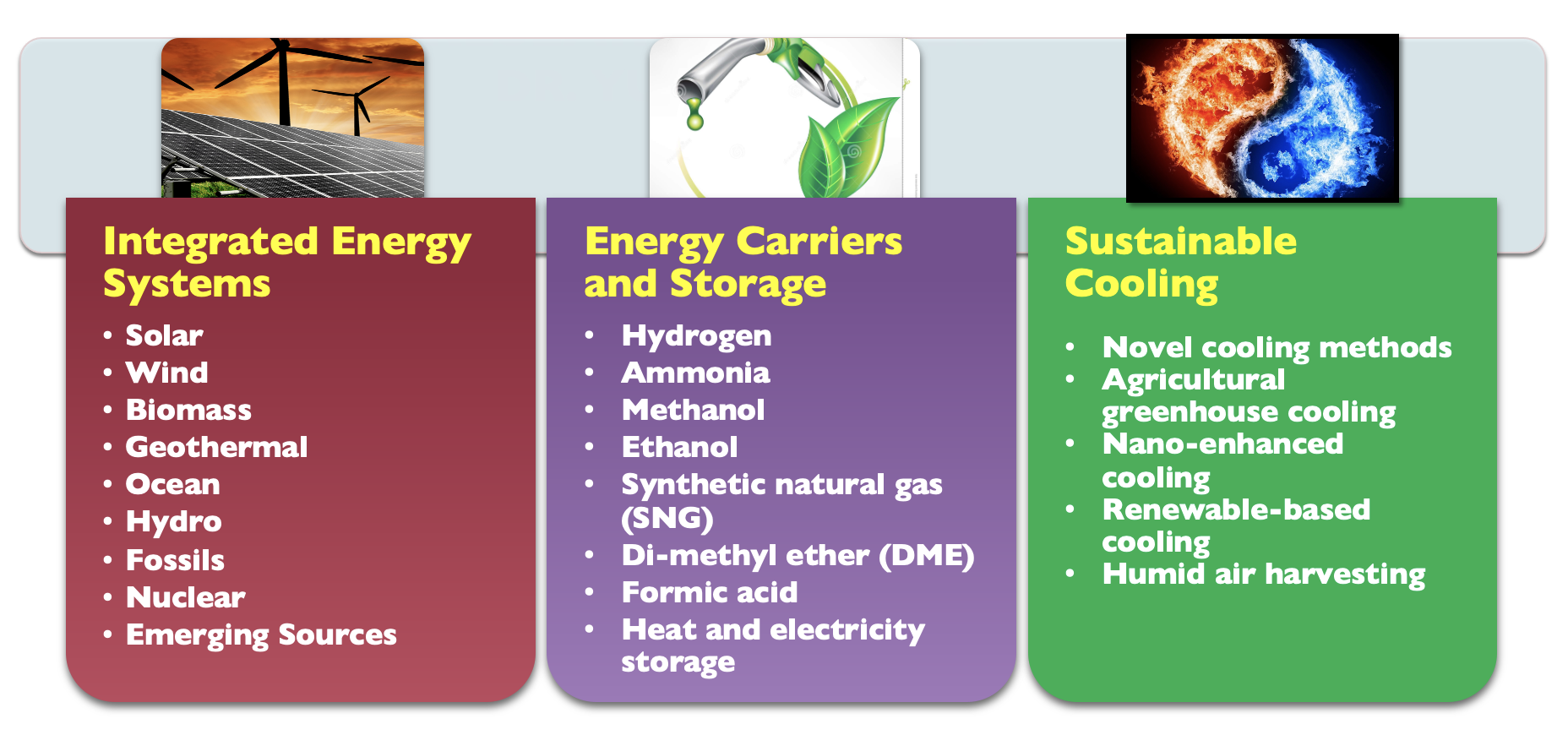
Classification of SUNREIS research areas
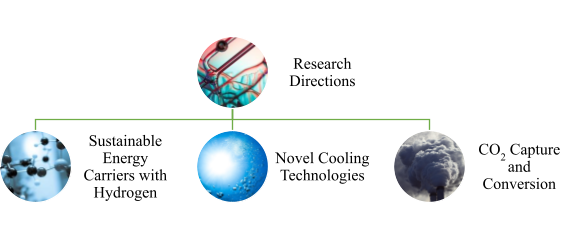
Summary of research directions
Research AREAS
Integrated Energy Systems
Integrated energy systems can offer better energy security, enable decentralized energy systems, and reduce environmental impacts. Renewable energy sources are usually accessible at any location in the world depending on the type, however, harvesting these renewable energy sources and transforming them into useful products is a challenging task because of some major reasons namely, having fluctuating and intermittent characteristics and relatively low resource intensity.
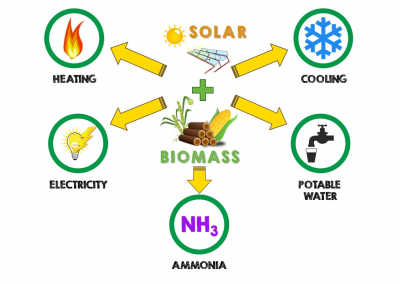
Thermodynamic assessment of an integrated renewable energy
multigeneration system including ammonia as hydrogen carrier and phase
change material energy storage
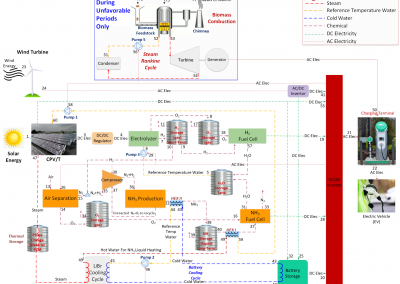
Development of an off-grid electrical vehicle charging station
hybridized with renewables including battery cooling system and
multiple energy storage units
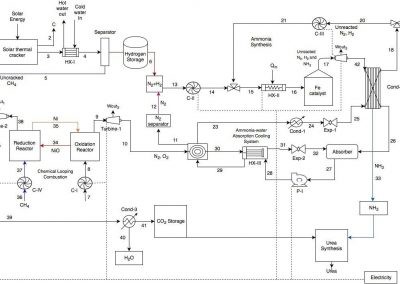
Thermodynamic assessment of chemical looping combustion and solar
thermal methane cracking-based integrated system for green ammonia
production
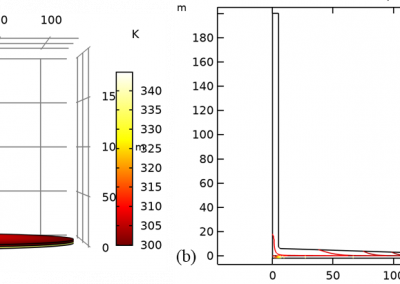
Comparison of the influence of solid and phase change materials
as a thermal storage medium on the performance of a solar
chimney
Energy Carriers and Storage
The efficient storage and transport of energy by means of energy carriers is very vital since availability of energy resources are limited to certain regions of the world. There are several methods of energy carriers like electricity, chemical fuels (hydrogen, ammonia etc.), heat, etc. All these energy carriers are crucial for transporting the energy produced in remote and rural locations to urban areas, where the energy demand is higher. Therefore, there is a need to deliver novel, integrated, and cost-effective energy carrier and storage solutions.
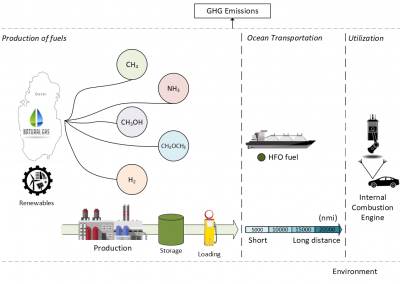
Comparative life cycle assessment of sustainable energy carriers
including production, storage, overseas transport and utilization
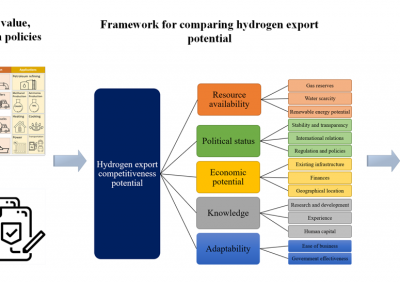
Hydrogen strategy as an energy transition and economic transformation avenue for natural gas exporting countries
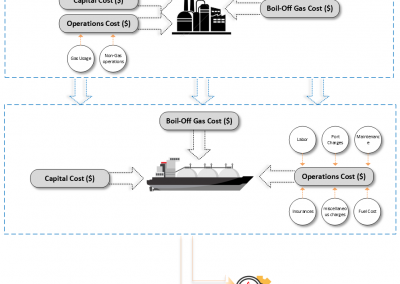
Comparative cost assessment of sustainable energy carriers produced
from natural gas accounting for boil-off gas and social cost of carbon
Sustainable Cooling
Hot arid climates face considerable challenges related to the increased demand and intensive consumption of energy for cooling specifically in residential sector and for securing food production. In hot climates such as Qatar, more than half of the electricity is commonly consumed by the residential sector and air-conditioning is the fundamental part of this consumption. Due to rise of global food demand, controlled greenhouses become essential parts of food production. The increase of greenhouses in several hot regions will obviously impose additional water and cooling requirements. The air conditioning in hot and arid climates remains as one of the grand challenges. Therefore, there is an obvious necessity to design and develop sustainable, smart, novel, efficient and environmentally friendly cooling techniques.
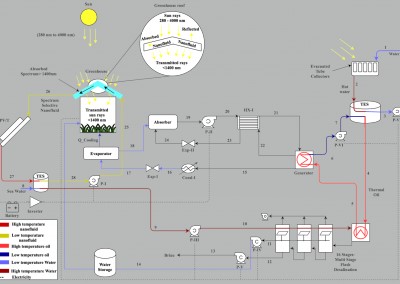
Performance Assessment of Spectrum Selective Nanofluid-Based Cooling for a Self-Sustaining Greenhouse
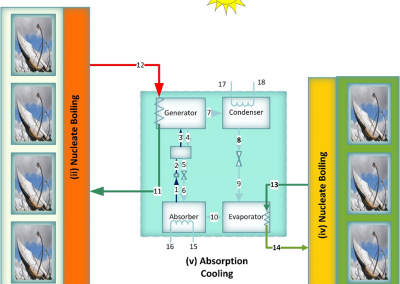
Performance evaluation of self-cooling concentrating photovoltaics
systems using nucleate boiling heat transfer
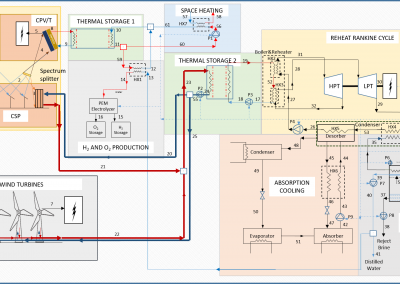
Design and analysis of an integrated concentrated solar and
wind energy system with storage
PROJECTS
Salt-based Cooling and Wastewater/Brine Reuse by Photo-electrodialysis for Hydroponic Greenhouses
Qatar National Research Fund (QNRF) - Food Security
Role
Lead Principal Investigator
Duration
2024-2027
Solar Trade (ST): An Equitable and Efficient Blockchain-Enabled Renewable Energy Ecosystem – “Opportunities for Fintech to Scale up Green Finance for Clean Energy"
AICC05-0508-230001, Qatar National Research Fund (QNRF)
Role
Principal Investigator
Date
2024-2027
QASR-H2: Accelerating the Energy Transition for a Sustainable Energy Future in Qatar
Qatar National Research Fund (QNRF)
Role
Principal Investigator
Duration
2024-2027
Green hydrogenated mineral water from Qatari groundwater and brine for improved human, farm animal and plant health in Qatar
Qatar National Research Fund (QNRF) - Food Security
Role
Lead Principal Investigator
Duration
2025-2028
Development of novel and sustainable cooling technologies for self-sufficient greenhouses and buildings.
Qatar National Research Fund (QNRF)
Role
Lead Principal Investigator
Duration
2020-2023
12th International Exergy, Energy and Environment Symposium (IEEES-12
Conference and Workshop Sponsorship Program (CWSP), Qatar National Research Fund (QNRF)
Date
20-24 December 2020
Green Hydrogen Demonstration for Electric Vehicle Charging Station in Abu Hamour
Industrial Innovation Fund (IIF), Innovation Center, Hamad Bin Khalifa University, MARUBENI, KAHRAMAA.
Role
Lead Principal Investigator
Duration
09/2021-03/2023
Development of a Highly Efficient and Practical Carbon Management System for Improving Qatar’s Sustainability: A Holistic Approach
Qatar National Research Fund/ National Priority Research Program – CLUSTER TRACK
Role
Lead Principal Investigator
Duration
January 2021-January 2026
SunReis (Sustainable Utilization of Novel Renewable Energy Integration & Storage)
SunReis (Sustainable Utilization of Novel Renewable Energy Integration & Storage) is a research group at Hamad Bin Khalifa University, Qatar, led by Dr. Yusuf Bicer. The acronym is derived from 'sunrays', where “reis” means leader/president in Arabic and Turkish. The group’s research interests include sustainability, energy storage, energy carriers, hydrogen, ammonia, integrated energy systems, cooling, desalination, carbon capture & management and renewable energy sources such as solar, wind, and ocean.

